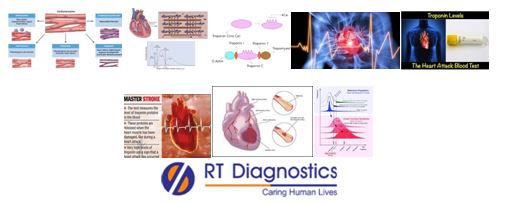Troponin - I:
Why Troponin - I Test?
CLINICAL INFORMATION
Troponins are referred to as a group of muscle proteins that help regulate the contraction of the heart and skeletal muscle fibres (cardiac and skeletal muscle). Troponin T (TnT) and Troponin I (TnI) in cardiac muscle are presented by forms different from those in skeletal muscles. Two isoforms of Tn I and Tn T are expressed in human skeletal muscle tissue (skTnI and skTnT). Since only one specific isoform of TnI is present in cardiac muscle tissue (cTnI – cardiac troponin I, is expressed only in the myocardium), it serves as a better cardiac marker (than cardiac troponin T) for pathologies associated with the heart in the screening tests for diagnostics. While cTnT (cardiac troponin T) is less cardiac-specific, its expression in skeletal tissue is more predominant and hence serves as a significant marker tool in chronic skeletal muscle injuries such as kidney failure, inflammatory muscle diseases like rhabdomyolysis, polymyositis or dermatomyositis. While both troponin T and troponin, I can both be simultaneously be increased in conditions such as drug and toxin-induced cardiomyocyte toxicity. Troponin is a component of a thin filament along with actin and tropomyosin. Troponin or troponin complex constitutes three regulatory proteins (namely troponin C, troponin I, and troponin T) that are an integral parts of skeletal and cardiac muscle contraction. The evaluation of (cardiac-specific) troponin I and troponin T levels are used exclusively as marker indicators in the diagnostic screening and prognosis of cardiac pathologies such as myocardial infarction, acute coronary syndrome etc. this test also aids in myocardial injury, stroke etc. Troponin is attached to the tropomyosin protein that lies within the groove between actin filaments in the muscle tissue. When the muscle cell is stimulated to contract by an action potential, the calcium channels are triggered to open in the sarcoplasmic membrane and the influx of calcium occurs within the sarcoplasm. Thus the calcium attaches to the troponin and a change in configuration occurs that alters the shape thus exposing the binding site for myosin. A cross-bridge formation is formed when actin binds to the myosin, thus resulting in the contraction of a muscle. While during a relaxed state of a muscle tropomyosin blocks the attachment site for the myosin cross-bridges, thus preventing contraction of the muscle. Troponin T (TnT) is a tropomyosin-binding subunit which regulates the interaction of the troponin complex with thin filaments. While troponin I (TnI), inhibits ATPase activity of Acto-myosin. Whereas troponin C (TnC) is a calcium-binding subunit that plays a vital role in the calcium-dependent regulation of muscle contraction. Cardiac troponins are markers of all heart muscle damage. Critical abnormal levels of other cardiac biomarkers are also relevant. Another cardiac biomarker is creatine phosphokinase since it is associated with cardiac muscle damage or death (during Myocardial Infarction). Other cardiac pathologies associated with increased troponins include myopathies, severe tachycardia, supraventricular tachycardia, heart failure, myocarditis, pericarditis, myopericarditis, dilated cardiomyopathy, hypertrophic cardiomyopathy, left ventricular hypertrophy, peripartum cardiomyopathy, Takotsubo cardiomyopathy, amyloidosis (infilterative disorders), cardiac contusion, defibrillation, cardiac surgeries (angioplasty, stenting), heart transplantation, atrial septal defects, percutaneous coronary intervention, radio-frequency ablation and certain medications like metoprolol etc. A few non-cardiac conditions such as strenuous exercise & marathon runners and pathologies associated with increased troponins include burns, critical illnesses such as sepsis, severe GI bleeding, chemotherapy agents, several toxins and venoms, cyanide poisoning, carbon monoxide poisoning, abnormal hypoxic cardio-toxic conditions, pulmonary hypertension, pulmonary embolism, COPD, end-stage kidney disease (elevated levels of troponin T serves as a key marker for diagnostics), inflammatory muscle diseases like rhabdomyolysis, polymyositis or dermato-myositis, preeclampsia etc. Detection of cardiac troponin T and cardiac troponin I are measured by immunoassay methods etc. This Troponin I test is most often used to diagnose a heart attack, heart block, angina, coronary artery disease, MI, or congestive heart failure moreover test results can help in stress-induced ischemia, kidney diseases, blood clot in the lungs etc. Hence high troponin test results indicate an acute (or chronic and/or recurrent episodes) heart ailment, which results in the release of troponin from muscle (during a muscle injury) into the bloodstream which is a clear indication used for screening as a diagnostic marker in the cardiology medicine. Clinical manifestations indicated for heart attack include signs and symptoms of chest pain and discomfort, pain radiating to parts of the body such as the arm, jaw, neck, back etc, trouble breathing, nausea, vomiting, fatigue, dizziness, intense sweating etc. Additional tests include Creatine phosphokinase, LDH, blood clotting markers, inflammatory markers etc. Other tests include ECG, ECHO, myoglobin, chest X-ray, imaging studies like CT Scan etc.

General Instructions:
Sample Requirement: Specimen - Blood sample collected from the vein. Test Preparation: None.
NOTE - Sample for specimen collections may vary based on the patient’s condition/cases according to the patient’s presenting complaints/signs or symptoms:
SPECIMEN REQUIREMENT (Special or Rare Cases) - As instructed and guided by Physician / Clinician / Pathologist / as per Laboratory’s requirements, according to procedures and protocols.
This Multi-Specialty Clinical Referral Laboratory RT DIAGNOSTICS provides precise and accurate tests with an extensive range of testing services to the medical centres to help in the diagnosis and identification of pathology in the test specimens for infectious diseases and also to evaluate the function of organ systems of the patient. It prevents further complications and helps to stabilize and restore health to near normalcy at the earliest without delay.



